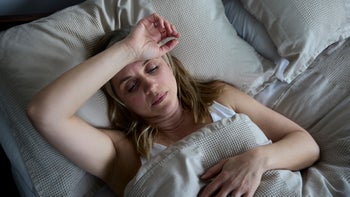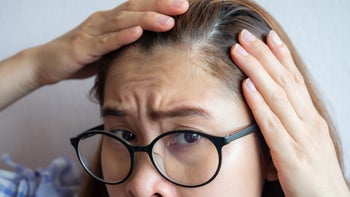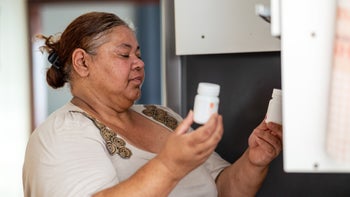
8 Natural Remedies for Hot Flashes
Key takeaways:
Hot flashes are a common part of menopause, but they can be quite uncomfortable and disruptive to daily life. Fortunately, there are treatment options that can offer hot flash relief.
Natural remedies for hot flashes include dietary and lifestyle changes and supplements. These treatments can lower how often, how long, and how strong you get your hot flashes.
Hot flashes can sometimes last a long time. They can continue for months to years after menopause.
Table of contents

You might be one of the more than 80% of people feeling the heat of menopause. The midlife transition to menopause (when your monthly periods stop) often comes with hot flashes. Hot flashes are sudden bursts of internal heat and can include sweating on the face, neck, or chest. These flashes of heat are unpleasant, uncomfortable, and unpredictable.
While there’s no cure for hot flashes, there are lifestyle changes and non-hormonal therapies that may help you turn the heat back down. If you’re looking for natural hot flash remedies, there are a few options that have been shown to help. Let’s take a closer look at these alternative treatments for hot flashes and what you can do to get fast relief.
1. Exercise
Regular exercise, three or more times a week, may help ease your discomfort with hot flashes. Physical activity could lessen the length, severity, and number of hot flashes you have. People who stick to an exercise regimen self-report a better time handling hot flashes.
Exercise can also have a positive effect on other issues you may face with menopause. It may help to improve your:
Quality of sleep
Mood
Energy
Weight
Stress
Physical activity may also improve your outlook and reaction to hot flashes. This may make it a little easier to cope with them.
There’s some data that exercise might actually trigger hot flashes in some people by raising your body temperature. If you notice an increase in hot flashes with exercise, try a low-intensity exercise like walking.
2. Increase your fruits and veggies
Eating more water-rich foods, such as fruits and vegetables, may help limit hot flashes. Tweaking your diet can help cool the body down and keep you hydrated. A few staples with high water content to keep on hand are:
Lettuce
Cucumbers
Berries
Watermelon
Bananas
Avocados
Celery
Broccoli
Carrots
A Mediterranean diet can also tame hot flashes. Although it’s not entirely clear why, people who eat this kind of a diet seemed to have fewer hot flashes. The Mediterranean diet typically includes:
Fruits
Vegetables
Grains
Potatoes
Beans
Nuts
Olive oil
Dairy
Eggs
Small amounts of fish and poultry
A plant-based diet along with whole soybeans may also help to control hot flashes. Soybeans contain isoflavones. In some people, these are broken down to equol (an estrogen-like substance) by bacteria in the gut. This is especially the case when eaten as a part of a vegetarian or vegan diet. For some, equol could lead to fewer hot flashes.
3. Limit spicy and sugary foods
You may need to cut back on hot or spicy and sugary foods to curb hot flashes. Adding a kick to your meal with chili powder, peppers, and other spices can cause blood vessels to widen. This could then lead to sweating and flushing.
Also, spikes in blood sugar raise the likelihood of hot flashes. If you’re in the early years of menopause or African American, having a higher blood sugar may be more likely to cause vasomotor symptoms.
4. Choose water instead
Your choice of beverage may make a difference if you have hot flashes. It might be a good idea to limit your intake of caffeinated and alcoholic drinks. They can trigger or worsen hot flashes in some people.
The data is mixed for alcohol, though. Some studies show that it may help, while others show that alcohol can worsen hot flashes. This may be because alcohol dilates (widens) the blood vessels, as spicy foods do, so it could bring on the heat. Either way, the consensus among health providers is to keep your drinking at a light to moderate level.
You can do this by limiting yourself to one drink or less a day. If your hot flashes are hard to control, it might be a good idea to cut down on the alcohol.
That said, it may be a better choice to quench your thirst with water. Replacing water loss from hot flashes can help to maintain a lower body temperature. Being dehydrated can raise your temperature, but sipping water can help prevent that.
5. Stop smoking
It’s always a good time to kick the habit and stop smoking. If you haven’t been able to do so, transitioning to menopause may give you an incentive. It’s unclear why hot flashes are worse if you smoke. But it might lower your estrogen levels, which may raise your chances of hot flashes.
If you’re struggling with hot flashes and you smoke, try setting a quit date. Among the many benefits of quitting, it may just help you cool off and help your hot flashes, too.
6. Try to keep cool
Hot flashes can be triggered by changes to your body’s core temperature. Keeping your body temperature steady and cool can help hot flashes. Try to be proactive about staying cool, including what you wear. Style your wardrobe to keep cool. Dress in loose-fitting layers, so when the heat is on, you can shed layers.
You may want to choose fabrics that breathe, such as linen, rayon, and cotton. Wearing moisture-wicking clothes may also help you stay drier.
The same thing is true at night. Cooling pajamas, sheets, and a mattress can help lull you into a restful night sleep. You can also turn the thermostat down. You may find your comfort zone to be between 60°F and 72°F. But you can move it up or down as needed.
7. Stay calm and quiet stress
Anxiety can set the body’s fight-or-flight response in motion, leading to a rise in body temperature. This can trigger a wave of intense heat that feels like a hot flash. Anxiety and stress levels have also been linked to a greater severity and number of hot flashes.
The good news is you can lower the effect of stress on your body. A few ways you can manage anxiety include:
Yoga
Meditation
Acupuncture
Journaling or doodling
8. Supplements
Taking herbal supplements may take the edge off of uncomfortable hot flashes and give you some relief. Plants, roots, and herbs have compounds called phytoestrogens. They mimic the effects of estrogen and lower the risk of flushing and sweating.
But some supplements for hot flashes don’t mix well with prescription medications and may even be harmful. Speak with your healthcare professional about these before giving them a try:
What causes hot flashes?
The exact reason hot flashes occur isn’t fully understood. But it may be due to a shift in hormones and a dysfunction in the body’s temperature control system. During menopause there are many hormonal changes. These changes include:
A drop in estrogen levels
A raise in norepinephrine levels
An overexpression of serotonin receptors
This chain of events may lead to a sensitivity to changes in body temperature. And this may trigger menopausal hot flashes.
How long will hot flashes last?
It’s unclear how long hot flashes last. Hot flashes usually don’t end once menopause actually starts — they can go on for many years beyond that. The average length of menopause symptoms is 7 years, but it can go on for over 10 years.
Everyone is different. If hot flashes greatly affect your quality of life, you should speak with a healthcare professional. In severe cases, a combination of natural remedies and hormone replacement therapy could be an option.
The bottom line
There’s no one sure-fire way to treat hot flashes. But a combination of natural remedies can give you hot flash relief. Dietary changes, supplements, and day-to-day changes can help your hot flashes. It will likely require trial and error to find out the best treatment.
But remember, natural remedies can have side effects, too. So make sure you talk with a healthcare professional for guidance on where to start.
References
American College of Obstetricians and Gynecologists. (2023). What can I do to help with hot flashes?
Bailey, T. G., et al. (2016). Exercise training reduces the frequency of menopausal hot flushes by improving thermoregulatory control. Menopause.
Bansal, R., et al. (2019). Menopausal hot flashes: A concise review. Journal of Mid-Life Health.
Barnard, N. D., et al. (2021). The women's study for the alleviation of vasomotor symptoms (WAVS): A randomized, controlled trial of a plant-based diet and whole soybeans for postmenopausal women. Menopause.
Berin, E., et al. (2019). Resistance training for hot flushes in postmenopausal women: A randomised controlled trial. Maturitas.
Carpenter, J., et al. (2015). Nonhormonal management of menopause-associated vasomotor symptoms: 2015 position statement of the North American Menopause Society. Menopause.
Centers for Disease Control and Prevention. (2022). Water and healthier drinks.
Centers for Disease Control and Prevention. (2023). How to quit.
Faubion, S. S., et al. (2015). Caffeine and menopausal symptoms: What is the association? Menopause.
Freeman, E. W., et al. (2005). The role of anxiety and hormonal changes in menopausal hot flashes. Menopause.
Freeman, E. W., et al. (2016). Anxiety as a risk factor for menopausal hot flashes: Evidence from the Penn Ovarian Aging Cohort. Menopause.
Gallicchio, L., et al. (2015). Risk factors for hot flashes among women undergoing the menopausal transition: Baseline results from the Midlife Women's Health Study. Menopause.
Herber-Gast, G. C. M., et al. (2013). Fruit, Mediterranean-style, and high-fat and -sugar diets are associated with the risk of night sweats and hot flushes in midlife: Results from a prospective cohort study. American Journal of Clinical Nutrition.
Kargozar, R., et al. (2017). A review of effective herbal medicines in controlling menopausal symptoms. Electronic Physician.
Kwon, R., et al. (2022). Alcohol consumption patterns and risk of early-onset vasomotor symptoms in premenopausal women. Nutrients.
Mahajan, A., et al. (2018). Hot flashes—How long ?? Journal of Mid-Life Health.
Meissner, H. O., et al. (2005). Use of gelatinized maca (Lepidium peruvianum) in early postmenopausal women. International Journal of Biomedical Science.
Mirabi, P., et al. (2013). The effects of valerian root on hot flashes in menopausal women. Iranian Journal of Pharmaceutical Research.
Morrow, P. K. H., et al. (2011). Hot flashes: A review of pathophysiology and treatment modalities. The Oncologist.
National Institute on Aging. (2021). Hot flashes: What can I do? National Institutes for Health.
Office of Dietary Supplements. (2020). Black cohosh: Fact sheet for health professionals. National Institutes of Health.
Pacheco, D., et al. (2024). Bedroom environment: What elements are important? Sleep Foundation.
Safabakhsh, M., et al. (2020). Higher intakes of fruits and vegetables are related to fewer menopausal symptoms: A cross-sectional study. Menopause.
Schilling, C., et al. (2007). Current alcohol use, hormone levels, and hot flashes in midlife women. Fertility and Sterility.
Setchell, K. D. R., et al. (2010). Equol: History, chemistry, and formation. The Journal of Nutrition.
Smith, R. L., et al. (2015). Does quitting smoking decrease the risk of midlife hot flashes? A longitudinal analysis. Maturitas.
Steels, E., et al. (2017). Efficacy of a proprietary Trigonella foenum-graecum L. de-husked seed extract in reducing menopausal symptoms in otherwise healthy women: A double-blind, randomized, placebo-controlled study. Phytotherapy Research.
Thurston, R. C., et al. (2012). Vasomotor symptoms and insulin resistance in the study of women's health across the nation. Journal of Clinical Endocrinology and Metabolism.

























